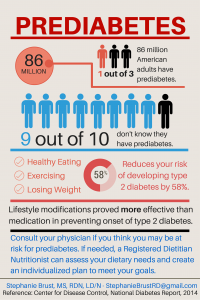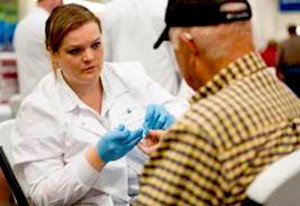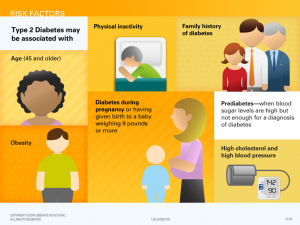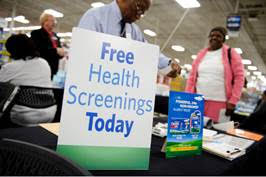Twenty-one million adults have diabetes in the United States, the Centers for Disease Control and Prevention (CDC) reports.Tragically, another 8.1 million adults have the disease but are yet to be diagnosed and thus are not treating a condition that can have devastating effects on the body. To improve detection of the disease in the United States, Sam’s Club stores across the country are hosting free diabetes health screenings on Saturday, Sept. 12, from 11 a.m. to 3 p.m.
Diabetes is a disease where the body is unable to make enough of the hormone insulin because the immune system damages or destroys beta cells in the pancreas (type 1 diabetes) or where the cells in the body are resistant to insulin and are unable to use it as effectively, raising blood sugar levels (type 2 diabetes). Insulin is a hormone produced by the pancreas that allows the body to use glucose from carbohydrates in the food that you consume for energy or to store glucose for future use. Insulin helps keep blood sugar levels from getting too high or too low. Long-term complications can arise if blood glucose levels remain elevated for extended periods of time.
The most common risk factors for type 2 diabetes are being overweight or obese, having a sedentary lifestyle, impaired glucose tolerance with prediabetes, high blood pressure and low levels of HDL and high levels of LDL cholesterol. People over the age of 45 and women with polycystic ovary syndrome (PCOS) also have a higher risk for the disease. Diabetes also appears to be more prevalent in Hispanic/Latino Americans, African-Americans, Native Americans, Asian Americans, Pacific Islanders, and Alaska natives.
Adopting a healthy diet, exercising three or more times a week and losing weight, as well as quitting smoking, can help prevent diabetes and decrease the likelihood of developing diabetes-related complications for those already diagnosed with the disease. Those with diabetes can reduce complications of the eyes, kidneys, nerves and heart by getting regular eye and foot exams, as well as routinely testing and monitoring their blood glucose levels and blood pressure.
Sam’s Club began offering free diabetes health screenings five years ago as a part of the company’s ongoing commitment to help the communities it serves gain access to free health services. The screenings are intended to foster better detection of diabetes and prediabetes—a condition where blood sugar levels are higher than normal, which, unmanaged, increase the risk for developing type 2 diabetes. Fasting blood glucose, glucose tolerance, or hemoglobin A1C tests can be used to diagnose prediabetes and diabetes.
 According to the 2014 National Diabetes Statistics Report by the CDC, 90 percent of adults with prediabetes in the United States has not yet been diagnosed. An estimated 79 million Americans, age 20 years or older, have prediabetes. As people with this condition are at increased risk for developing full-blown diabetes, they should have their blood glucose levels checked six months to a year after their first elevated blood glucose test. Those with blood glucose levels in the normal range can then be tested every three years, or as recommended by a doctor. Making key lifestyle changes mentioned above are especially important for diabetes prevention
According to the 2014 National Diabetes Statistics Report by the CDC, 90 percent of adults with prediabetes in the United States has not yet been diagnosed. An estimated 79 million Americans, age 20 years or older, have prediabetes. As people with this condition are at increased risk for developing full-blown diabetes, they should have their blood glucose levels checked six months to a year after their first elevated blood glucose test. Those with blood glucose levels in the normal range can then be tested every three years, or as recommended by a doctor. Making key lifestyle changes mentioned above are especially important for diabetes prevention
Untreated or improperly managed, diabetes can cause a variety of disabling and life-threatening conditions, including heart disease and stroke, kidney disease, diabetic retinopathy leading to blindness and nerve conditions leading to amputations. In 2010, diabetes was the seventh leading cause of death in the U.S.. The Sam’s Club health screenings can help diagnosed diabetes assess—and if necessary, improve—their management of the condition.
All Sam’s Club locations with a pharmacy will be holding diabetes health screenings this Saturday from 11 a.m. to 3 p.m. The screenings, valued at $250, include tests for:
- A1C—a test that measures your average blood glucose level over the past three months
- Glucose—a test that measures the current amount of sugar in your blood
- Blood pressure—high blood pressure, or hypertension, can lead to diabetes and can worsen many complications of the disease, including diabetic eye disease and kidney disease. According to WebMD, most people with diabetes develop high blood pressure at some point because the disease can damage arteries, making them targets for hardening (arthesclerosis), which untreated can lead to blood vessel damage, cardiovascular conditions or kidney failure.
- Total cholesterol—measures the sum of low-density lipoprotein (or “bad cholesterol”), high-density lipoprotein and 20 percent of triglyceride levels.
- HDL—high-density lipoprotein, or “good” cholesterol; higher levels of HDL are optimal, while low levels increase the risk for heart disease
- Cholesterol Risk Ratio—determined by dividing one’s HDL cholesterol into one’s total cholesterol number; an optimal ratio is less than 3.5 to 1; a higher ratio indicates a higher risk for developing heart disease. Having diabetes increases your risk for heart disease and stroke; keeping blood glucose, blood pressure and cholesterol as close to recommended target numbers as possible can help lower this risk.
- Body Mass Index (BMI)—measures body fat based on a dividing a person’s weight in kilograms by the square of height in meters; a high BMI can indicate high body fat, or obesity, which is a major risk factor for developing diabetes.
Click here to find a participating Sam’s Club store in you area.
Every year, Sam’s Club hosts 10 free monthly health screenings from January to October, offering a wide range of tests to help assess various risk factors and identify potential health issues. Previous screenings this year have focused on Men’s Health, Heart Health, and Healthy Aging; next month’s screening will center on Women’s Health.



Leave a Reply